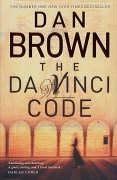Dan Brown: Looking Behind the Code
In the unfolding story of Dan Brown’s The Da Vinci Code, an amazing secret is discovered to have been hidden within Leonardo Da Vinci's magnificent works of art. The art is not neutral, but used as a vehicle to communicate a message. That which seemed benign and innocent is revealed through art history to be controversial. Thousands of people viewing Da Vinci's work, caught up in their appreciation, were completely unaware that they were being communicated to.
 Brown uses the book - like he argues Da Vinci uses his art - to communicate his own personal views about the origin of Christianity. He says, 'While it is my belief that the theories discussed by these characters have merit, each individual reader must explore these characters' viewpoints and come to his or her own interpretations' (www.danbrown.com - Da Vinci Code FAQs). He also says, 'The theory I reveal is one that has been whispered for centuries. It is not my own. Admittedly, this may be the first time the theory has been unveiled within the format of a popular thriller, but the information is anything but new. My sincere hope is that The Da Vinci Code, in addition to entertaining people, will serve as an open door for readers to begin their own explorations' (Da Vinci Code FAQs).
Brown uses the book - like he argues Da Vinci uses his art - to communicate his own personal views about the origin of Christianity. He says, 'While it is my belief that the theories discussed by these characters have merit, each individual reader must explore these characters' viewpoints and come to his or her own interpretations' (www.danbrown.com - Da Vinci Code FAQs). He also says, 'The theory I reveal is one that has been whispered for centuries. It is not my own. Admittedly, this may be the first time the theory has been unveiled within the format of a popular thriller, but the information is anything but new. My sincere hope is that The Da Vinci Code, in addition to entertaining people, will serve as an open door for readers to begin their own explorations' (Da Vinci Code FAQs).
When Brown was asked what he thought of the scholars attempting to disprove one of the central theses of the fictional adventure, the Da Vinci code itself, he said: 'The dialogue is wonderful. These authors and I obviously disagree, but the debate that is being generated is a positive powerful force' (Da Vinci Code FAQs). Notice that he didn't say that the characters in the book would disagree with these scholars, but that he disagrees. That's important, because it means that we need to recognize that Brown's characters do, to some degree, speak for him. But it's not just in The Da Vinci Code that Brown communicates his questions and opinions. In interviews and discussions he's spoken in even more detail about his point of view. He explains that like many of us he grew up surrounded by what he calls, 'the paradoxical philosophies of science and religion' (www.danbrown.com - Meet Dan Brown).
The Da Vinci Code isn't only a great escapist thriller. It is also an attempt to discuss big theological and philosophical ideas at the popular level through a story. This is an invitation not to make personal attacks, but to interact and to dialogue in the pursuit of truth and answers. As Brown says, 'We are all trying to decipher life's big mysteries. Where did we come from? What happens when we die? Where are we going? What does this mean?' (DVC NH writers talk on www.danbrown.com [No longer available - the link takes you to Dan Brown's home page. Ed.]).
I want to pick out four of Dan Brown's foundational beliefs: his beliefs about knowledge, interpretation, truth and religious pluralism. As far as possible I'll be using material where he speaks directly about his own views, and not drawing material directly from The Da Vinci Code story itself. I hope that this will give you confidence that we're actually talking about what he really thinks, and not some clever literary smokescreen designed to provoke discussion rather than to communicate.
Knowledge
Understanding Brown's view of knowledge is absolutely foundational if you want to understand the rest of what he believes. We'll start with what he thinks knowledge is – and what it isn't. Dan grew up as the son of a mathematician and a church organist and says, 'I wasn't really sure where to turn. Where science offered exciting proofs of its claims, where there were photos, equations and visible evidence, religion was a lot more demanding. I had to accept everything on faith. As I'm sure you're aware faith takes a fair amount of effort – especially as a young child; especially in an imperfect world. So as a boy I graduated towards the solid foundations of science.'
What exactly is Brown saying? To help us understand, we'll do a quick primer on what knowledge actually is. Philosophically speaking, knowledge isn't a narrow category restricted only to what can be proved or shown in a lab, or deduced using maths and logic. It's a big category that includes:
- Scientific knowledge (acid neutralizes alkali)
- Logical / Mathematical knowledge (all bachelors are unmarried)
- Experiential knowledge (knowing you had breakfast, knowing you exist as a person)
- Moral knowledge (paedophilia is wrong)
- Religious knowledge (moments of peace when we pray – God is with me, or things we know by revelation)
- Historical knowledge (Roman soldiers were part of the Roman Empire)
For Dan Brown, the security that he found in the 'photos, equations and visible evidence' of scientific knowledge left other kinds of knowledge out in the cold. They started to look unappealing, or they seemed like they would be too much effort. And his recognition of the existence of suffering in the world added an extra push towards his view that religious belief required him 'to accept everything on faith.' Brown believes that scientific knowledge, or empirical knowledge, is much more solid and easy to trust than religious knowledge.
Brown thinks that science is easy to trust and depend on (at least at first glance), and 'faith' or religious knowledge is much harder to accept and approach. He says, 'I really wish I had the luxury of absolute unquestioning faith. I do not. And I am still searching. I wrote this novel as part of my own spiritual quest. I never imagined a novel could become so controversial.'
Interpretation and truth
Flowing out of Dan Brown's basic commitment to the solid nature of scientific knowledge, and his musings about the 'ethereal' and 'hard to accept' nature of religious knowledge, comes his view of interpretation and, more specifically and relevantly, the interaction between this view and history. Brown describes how he interprets religious belief: 'Faith is a continuum . . . By attempting to rigidly classify ethereal concepts like faith, we end up debating semantics to the point where we entirely miss the obvious – that is, that we are all trying to decipher life's big mysteries, and we're each following our own paths of enlightenment.'
Dan Brown thinks that we all should be really careful when we talk about truth. Philosophy tells us that a good way of starting to get to grips with truth is to use the distinction between objective truth (absolute, true-for-all) and subjective truths (personal, true-for-me). He says, 'The world is a big place, now more than ever. There is an enormous danger in claiming that we are infallible, absolute [objective/true-for-all], and that everyone who does not think like we do is wrong, and therefore an enemy.' He thinks that we all should stop claiming that we know what is true-for-all, objective and absolute. In the name of global stability we need to stop thinking that we know what is true for everyone. Brown says, 'Our male dominated philosophies of absolutism have a long history of violence and bloodshed which continues to this day.'
From what I can see, Brown's view is that we should not claim to know something that is outside of the realm of scientific knowledge. We should be careful not to become too confident about our interpretation being correct. So when it comes to religion, Brown's view is that these truths are more on the 'true-for-me' side of things and not on the 'true-for-all' side of things. Failing to see this is a mistake, a failure to see that historical data or testimony is highly ambiguous – because it relies on a human being during its writing, and by us as we read it. Brown says that, 'The history that eventually becomes our truth, depends entirely on what we read and who our teachers are. My critics and I clearly have read different books and have had different teachers. Some of these people seem absolutely certain of their truth. And of that I am envious. As I said, I was not born with the luxury of absolute certainty.' So Brown thinks that all this should restrict our talk of what we find in historical religious texts to, at best, the probable, and we should put off all talk of the certain, absolute, objective or true-for-all.
Religious pluralism
We've mentioned that Dan Brown thinks that solid, true-for-all knowledge in matters of religious belief should be avoided for the sake of world peace. We're now going to look at his views on spirituality. Brown believes that, 'we are all trying to decipher life's big mysteries, and we're each following our own paths of enlightenment. I consider myself a student of many religions. The more I learn, the more questions I have. For me, the spiritual quest will be a life-long work in progress' (Da Vinci Code FAQs).
Brown sounds like he is advocating a view called 'Religious Pluralism.' The basic assertion of this view is that all roads lead to 'God'. No one religious or faith view is correct, nor should anyone claim that their particular religious outlook is absolute or objective. Brown believes we must each follow 'our own paths of enlightenment.' So does Brown believe in God? Not the God of Christian revelation, who creates a world separate from himself – but what alternative does Brown suggest? He says that, 'Particle physicists now believe that matter – that is, everything around us – is trapped energy . . . Each of us in this room are nothing more than pure energy manifesting itself in the shape of human beings . . . These same physicists who proclaim that everything around us is energy are now quietly asking if it is really coincidence that the vast majority of ancient religious texts, including the Bible, describe God as energy, and that they describe God as all around us.'
Conclusion
Dan Brown's basic beliefs about knowledge, interpretation, true-for-all truths and religious pluralism inform and affect his entire view of the world. So, how do we evaluate his ideas? Firstly, We can see that Brown isn't just writing stories, but he is trying to provoke discussion. As he says, 'My sincere hope is that The Da Vinci Code, in addition to entertaining people, will serve as an open door for readers to begin their own explorations' (Da Vinci Code FAQs).
Secondly, Brown thinks that scientific knowledge is reliable. Bravo. So do most of us. But isn't it a bit too narrow to see only scientific knowledge as reliable? Any theory we construct in the abstract must mesh with reality. When we compare our theories with reality, if they start to deny things that we really do know then something is wrong. Is Brown's view of knowledge more a product of his scientific bias rather than of a good hard look at the world that is there? For example, how can he say that making solid claims about religion isn't acceptable because he wasn't born with a knowledge of the truth himself? Surely, he wasn't born with absolute certainty in scientific knowledge either, and yet he permits – and puts a high value on – its claims.
Thirdly, Dan Brown closes the door firmly on true-for-all religious knowledge claims. He thinks that people who claim to know truth in the religious sphere are a danger to society. I think this is mistaken, but I can sympathise with why he takes this view. It is the classic oversimplification where 'tolerance' becomes the only acceptable view of other beliefs, and in the process becomes a true-for-all religious claim itself.
This is the logic of the insane because the response to injustice and intolerance requires a potentially stronger absolutist commitment to tolerance and peace. And if the objection is that absolutist claims cause oppression and instability, then wouldn't this be contradictory? As a rejoinder, someone might say that this is an absolute moral commitment, rather than a religious one. But even though Brown doesn't describe his own religious position on energy, matter and God as absolute, he ends up not far from it as he supports it with the 'solid knowledge of science' and stops barely short of accusing absolutists of being linked with violent chauvinists. He plunges the knife in when he says that 'he wasn't born with infallibility,' which transforms his comment about being 'envious' of those who are 'absolutely certain of their truth' from sympathy to sarcasm. He seems to portray the absolutist as someone who is inherently and unavoidably intolerant. But isn't it true to say that in taking this stance on God and energy he is implicitly, rather than explicitly, an example of someone making an absolute religious assertion? And, by his own logic, how is he therefore not a danger to the stable world?
Is the problem really absolutist religious knowledge – of the kind that drove Wilberforce to fight for the abolition of slavery, Mother Teresa to care for the sick and impoverished, Martin Luther King to stand firmly against racism, and the initial momentum for the provision of hospitals and universities? Or is the problem in fact those people who claim that they are religious but only use it as a veneer to cover their evil hatred for other human beings? So is Brown right to suggest that because of interpretative and social concerns we should put off all talk of the certain, absolute, objective or true-for-all? Or is he historically short-sighted and, to some extent, unaware of his over-immersion in a culture of media scare and hype? When it comes to the issue of interpretation, isn't it more reasonable to say that, while correct interpretation is difficult, it is not totally impossible?
Dan Brown claims to be a Christian, although he interprets this very broadly and, as we have seen, states that he is 'a student of many religions' (Da Vinci Code FAQs). He also says, 'I am still searching. I wrote this novel as part of my own spiritual quest.' But it seems that part of his spiritual quest is to attempt to undermine the historical basis of Christianity. He claims that Jesus and Mary Magdalene had a child who was whisked away to France after Jesus' crucifixion, but says, 'In my mind, the possibility that Jesus might have married Mary Magdalene in no way undermines the beauty of Christ's message' (Interview on www.cnn.com).
 If I had some time to talk with Dan Brown, I would beg him to look again at Jesus, because part of Jesus' message was his claim to be the only way to know God. If this is true, then he can't simply be added into the mix with everything else. If it is not true, then Jesus doesn't warrant being included in Brown's 'spiritual quest'.
If I had some time to talk with Dan Brown, I would beg him to look again at Jesus, because part of Jesus' message was his claim to be the only way to know God. If this is true, then he can't simply be added into the mix with everything else. If it is not true, then Jesus doesn't warrant being included in Brown's 'spiritual quest'.
Buy The Da Vinci Code from Amazon.co.uk or from Amazon.com
© 2004 Tom Price



